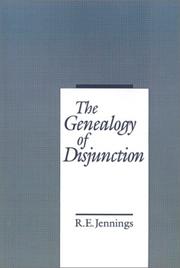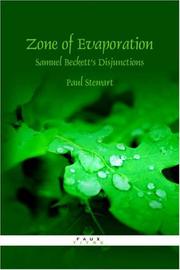| Listing 1 - 10 of 18 | << page >> |
Sort by
|
Article
Abstract | Keywords | Export | Availability | Bookmark
 Loading...
Loading...Choose an application
- Reference Manager
- EndNote
- RefWorks (Direct export to RefWorks)
Phanerogamae = Phanerogams --- chorology --- disjunct areas --- disjunction --- phytogeography
Article
Year: 1996
Abstract | Keywords | Export | Availability | Bookmark
 Loading...
Loading...Choose an application
- Reference Manager
- EndNote
- RefWorks (Direct export to RefWorks)
BR Staff Publications --- Africa --- Rubiaceae --- chorology --- disjunction --- endemism --- refuge theory
Article
Year: 1996
Abstract | Keywords | Export | Availability | Bookmark
 Loading...
Loading...Choose an application
- Reference Manager
- EndNote
- RefWorks (Direct export to RefWorks)
BR Staff Publications --- Madagascar --- Rubiaceae --- disjunction --- endemism --- phytogeography --- subsaharan Africa
Book
ISBN: 0198708963 128358896X 9786613901415 0191654817 9780191654817 9781283588966 9780191743290 0191743291 0199557918 9780199557912 Year: 2012 Publisher: Oxford Oxford university press
Abstract | Keywords | Export | Availability | Bookmark
 Loading...
Loading...Choose an application
- Reference Manager
- EndNote
- RefWorks (Direct export to RefWorks)
Duncan Pritchard offers an account of perceptual knowledge arguing that it is paradigmatically constituted by true belief that enjoys rational support which is reflectively accessible to the agent. This resolves the issue between intermalism and externalism, and poses a radical challenge to contemporary epistemology.
Disjunction (Logic) --- Knowledge, Theory of. --- Knowledge, Theory of
Article
Abstract | Keywords | Export | Availability | Bookmark
 Loading...
Loading...Choose an application
- Reference Manager
- EndNote
- RefWorks (Direct export to RefWorks)
South Africa --- alpine flora --- disjunction --- edaphic factors --- endemism --- floristics --- fynbos --- phytochorology
Book
ISBN: 9780198708964 9780199557912 Year: 2014 Publisher: Oxford Oxford University Press
Abstract | Keywords | Export | Availability | Bookmark
 Loading...
Loading...Choose an application
- Reference Manager
- EndNote
- RefWorks (Direct export to RefWorks)
Theory of knowledge --- Disjunction (Logic) --- Knowledge, Theory of --- Disjunctive propositions --- Proposition (Logic) --- Epistemology --- Philosophy --- Psychology

ISBN: 0195075242 0199852979 0195360559 1280442409 1423764749 Year: 1994 Publisher: Oxford Oxford university press
Abstract | Keywords | Export | Availability | Bookmark
 Loading...
Loading...Choose an application
- Reference Manager
- EndNote
- RefWorks (Direct export to RefWorks)
This is a comprehensive study of the English word or, and the logical operators variously proposed to present its meaning. Although there are indisputably disjunctive uses of or in English, it is a mistake to suppose that logical disjunction represents its core meaning. Or is descended from the Anglo-Saxon word meaning second, a form which survives in such expressions as "every other day." Its disjunctive uses arise through metalinguistic applications of an intermediate adverbial meaning which is conjunctive rather than disjunctive in character. These conjunctive uses have puzzled philosophers and logicians, and have been discussed extensively under such headings as "free choice permission." This study examines the textbook myths that have clouded our understanding of how or and other "logical" vocabulary comes to have something approaching its logical meaning in natural languages. It considers the various historical conceptions of disjunction and its place in logic from the Stoics to the present day.
Disjonction (Logic) --- Disjonction (Logique) --- Disjunctie (Logica) --- Or (Engels woord) --- Or (Mot anglais) --- Or (The English word) --- Disjunction (Logic) --- English language --- Disjunctive propositions --- Proposition (Logic) --- Etymology --- Disjunction (Logic). --- Or (The English word).

ISBN: 9401203415 1429456299 9781429456296 9042020776 9789042020771 9042020776 9789042020771 Year: 2006 Publisher: Amsterdam New York Rodopi
Abstract | Keywords | Export | Availability | Bookmark
 Loading...
Loading...Choose an application
- Reference Manager
- EndNote
- RefWorks (Direct export to RefWorks)
Zone of Evaporation: Samuel Beckett's Disjunctions is a valuable, and very readable, addition to Beckett studies. From Dream of Fair to Middling Women to How It Is , the book traces the modes of disjunction Beckett employed in his effort to "eff the ineffable". From the comic incongruities of Watt to the ontological gaps of The Unnammable, Zone of Evaporation demonstrates the crucial and consistent role disjunction played in Beckett's novels. The book describes Beckett's divergence from Proustian metaphor and the revelation of the "real" towards an art which exploited the gaps and fissures within language and narrative and, ultimately, to an art which would go on to upset the post-structuralism of Jacques Derrida. For those coming fresh to the works, Zone of Evaporation , written with an eye on the comic instincts of Beckett, provides almost a disjunctive guide to Beckett's early and mid-period novels. To the seasoned Beckett reader, Zone of Evaporation offers an engaging, and challenging, new perspective on Beckett's aesthetic practice.
Literature, Modern --- History and criticism. --- Beckett, Samuel, --- Beckett, Samuel --- Pei-kʻo-tʻe, Sa-miao-erh, --- Beḳeṭ, Samuel, --- Beckett, Sam, --- Беккет, Сэмюэль, --- בעקעט, סאמועל --- בקט, סמואל --- בקט, סמואל, --- بكت، ساموئل --- Bikit, Sāmūʼil, --- Criticism and interpretation. --- Disjunction (Logic) in literature. --- Technique. --- Disjunction (Logic) --- In literature. --- Disjunctive propositions --- Proposition (Logic)

ISBN: 9042020776 9401203415 1429456299 9789042020771 Year: 2006 Volume: 287 Publisher: Amsterdam Rodopi
Abstract | Keywords | Export | Availability | Bookmark
 Loading...
Loading...Choose an application
- Reference Manager
- EndNote
- RefWorks (Direct export to RefWorks)
Zone of Evaporation: Samuel Beckett's Disjunctions is a valuable, and very readable, addition to Beckett studies. From Dream of Fair to Middling Women to How It Is , the book traces the modes of disjunction Beckett employed in his effort to "eff the ineffable". From the comic incongruities of Watt to the ontological gaps of The Unnammable, Zone of Evaporation demonstrates the crucial and consistent role disjunction played in Beckett's novels. The book describes Beckett's divergence from Proustian metaphor and the revelation of the "real" towards an art which exploited the gaps and fissures within language and narrative and, ultimately, to an art which would go on to upset the post-structuralism of Jacques Derrida. For those coming fresh to the works, Zone of Evaporation , written with an eye on the comic instincts of Beckett, provides almost a disjunctive guide to Beckett's early and mid-period novels. To the seasoned Beckett reader, Zone of Evaporation offers an engaging, and challenging, new perspective on Beckett's aesthetic practice.
Beckett, Samuel, --- Criticism and interpretation --- Literature, Modern --- History and criticism. --- Beckett, Samuel --- Pei-kʻo-tʻe, Sa-miao-erh, --- Beḳeṭ, Samuel, --- Beckett, Sam, --- Беккет, Сэмюэль, --- בעקעט, סאמועל --- בקט, סמואל --- בקט, סמואל, --- بكت، ساموئل --- Bikit, Sāmūʼil, --- Criticism and interpretation. --- Beckett, Samuel, - 1906-1989 - Criticism and interpretation --- Disjunction (Logic) --- Technique. --- Disjunctive propositions --- Proposition (Logic) --- In literature. --- Beckett, Samuel, - 1906-1989
Book
ISBN: 9783110473292 3110473291 9783110473308 3110473305 9783110471991 311047199X 311047199X 3110472376 9783110472370 Year: 2017 Publisher: Berlin ;Boston : De Gruyter,
Abstract | Keywords | Export | Availability | Bookmark
 Loading...
Loading...Choose an application
- Reference Manager
- EndNote
- RefWorks (Direct export to RefWorks)
"Medieval thinkers were convinced that they themselves were still citizens of the empire, which had been founded by Augustus." This book is devoted to substantiate this claim of William Heckscher. It does so by tracing Antiquity's afterlife in various genres on the Iberian Peninsula. The book is a manifest for a special transformation and, moreover, continuation of antiquity in the so-called Middle Ages in Spain, going against the commonly held view that only the European Renaissance did justice to and came to the rescue of Antiquity. It describes how the Visigoths preserved classical Antiquity in the 6th and 7th century, how Roman influence manifests itself on the Pórtico de la Gloria of Santiago de Compostela, how the Iberian Peninsula was reluctant to adopt the European Gothic Art around 1200 and how the Catholic Kings went back to forms and ideas of late Antiquity around 1500. In doing so this book offers an alternative to the influential and, so far, widely accepted concept of the reception of Antiquity, which is Erwin Panofky's Principle of disjunction
Architecture, Medieval --- Art, Medieval --- Anti-Periodisierung. --- Antike /Rezeption. --- Kontinuität (der Antike). --- Roman-Romanesque. --- Römisch-Romanisch. --- anti-periodization [of art history]. --- continuation [of antiquity]. --- junction [instead of disjunction]. --- LITERARY CRITICISM / Ancient & Classical. --- Spain. --- Iberian Peninsula --- Hispania (Iberian Peninsula) --- Hispánica, Península --- Iberia (Iberian Peninsula) --- Ibérica, Península --- Península Hispánica --- Península Ibérica --- Antiquities.
| Listing 1 - 10 of 18 | << page >> |
Sort by
|

 Search
Search Feedback
Feedback About UniCat
About UniCat  Help
Help News
News